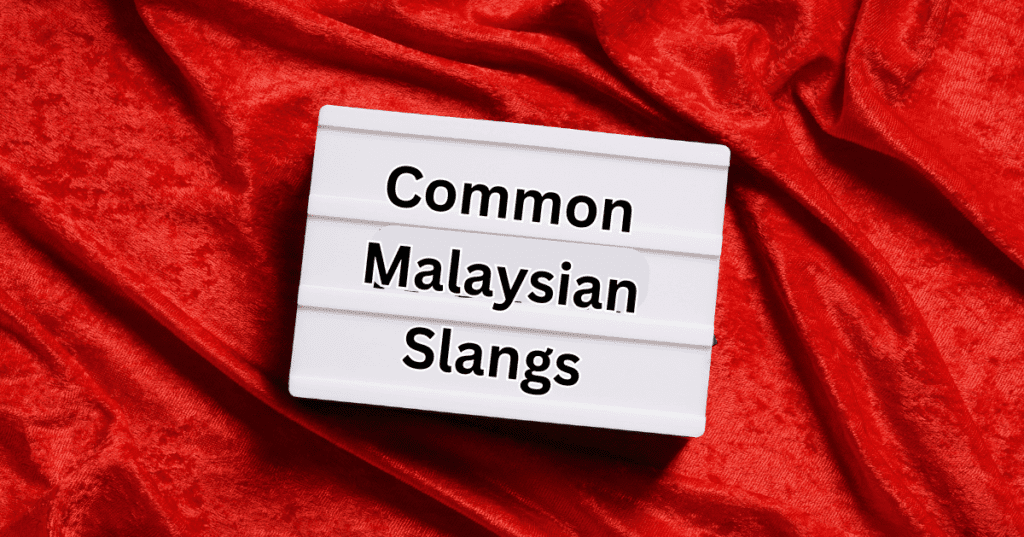Malaysia, a melting pot of cultures, languages, and traditions, boasts a rich tapestry of linguistic expressions. Among these are numerous slangs that capture the essence of Malaysian life, reflecting its multicultural society.
Whether you’re a visitor, an expatriate, or simply curious about Malaysian culture, understanding these slangs can offer valuable insights and help you navigate social interactions more smoothly.
Here’s an extensive look at 100 common Malaysian slangs, their meanings, and their cultural significance.
1. Lah
A ubiquitous suffix used to emphasize a point or soften a statement. It’s versatile and can be attached to almost any sentence. Example: “Okay lah” (Alright).
2. Wei
A casual way to call someone’s attention, similar to “hey” in English. Example: “Wei, come here!”
3. Lepak
Means to hang out or relax. Example: “Let’s lepak at the mamak.”
4. Mamak
Refers to Indian-Muslim eateries popular for late-night meals and social gatherings.
5. Syok
Means to feel good or enjoyable. Example: “This food is so syok!”
6. Kopi
Short for coffee. Example: “Let’s get a kopi.”
7. Aiyah
An expression of exasperation or frustration. Example: “Aiyah, why so slow one?”
8. Tapau
Means to take away food. Example: “Can I tapau this?”
9. Alamak
An expression of surprise or shock. Example: “Alamak, I forgot my keys!”
10. Cincai
Means to do something without much care or effort. Example: “Just cincai do it.”
11. Fuyoh
An expression of amazement. Example: “Fuyoh, that car is fast!”
12. Kantoi
Means to get caught doing something wrong. Example: “He kantoi cheating in the exam.”
13. Kautim
Means to settle or take care of something. Example: “Don’t worry, I’ll kautim it.”
14. Susah
Means difficult or troublesome. Example: “This project is so susah.”
15. Jaga
Means to take care of. Example: “Please jaga my bag.”
16. Gila
Means crazy. Example: “That guy is gila.”
17. Kepo
Means to be nosy or curious. Example: “Why you so kepo?”
18. Abuden
A sarcastic way of saying “of course.” Example: “You didn’t study? Abuden you fail lah.”
19. Pakat
Means to plan or scheme together. Example: “They pakat to surprise her.”
20. Bungkus
Means to wrap or pack up. Example: “Bungkus the leftover food.”
21. Cham
Means in a bad situation. Example: “I’m cham, forgot to do my homework.”
22. Teruk
Means terrible or severe. Example: “The traffic is teruk today.”
23. Boh liao
Means finished or out of something. Example: “The shop boh liao stock.”
24. Gostan
Means to reverse a vehicle. Example: “Gostan the car a bit.”
25. Kopi O
Refers to black coffee. Example: “I’ll have a kopi O.”
26. Kepochi
A more intense version of kepo. Example: “She’s such a kepochi.”
27. Koyak
Means torn or emotionally broken. Example: “After the breakup, he was koyak.”
28. Langgar
Means to collide or crash. Example: “He langgar the wall.”
29. Pak Tor
Means to date or go out with someone. Example: “They pak tor every weekend.”
30. Kiasu
A Hokkien term meaning a fear of losing out. Example: “He’s so kiasu, bought all the tickets.”
31. Hantu
Means ghost or spirit. Example: “This place is haunted by hantu.”
32. Shiok
Similar to syok, means enjoyable or satisfying. Example: “This durian is shiok!”
33. Mou liu
Means nonsensical or pointless. Example: “That movie was mou liu.”
34. Kapchai
Refers to a small motorcycle. Example: “He rides a kapchai to work.”
35. Sapu
Means to sweep or to take everything. Example: “They sapu all the discounts.”
36. Onz
Means to agree or be on board with something. Example: “You want to go? Onz!”
37. Panas
Means hot, both in temperature and spiciness. Example: “This curry is panas!”
38. Teh tarik
A popular Malaysian tea, meaning “pulled tea.” Example: “I’ll have a teh tarik.”
39. Yam cha
Means to drink tea or hang out. Example: “Let’s yam cha later.”
40. Muka tembok
Literally means “thick-faced,” describing someone who is shameless. Example: “He’s muka tembok, never apologizes.”
41. Potong stim
Means to kill the mood. Example: “That joke really potong stim.”
42. Gatal
Means itchy or flirtatious. Example: “He’s so gatal with all the girls.”
43. Chiak
Means to eat. Example: “Let’s chiak dinner.”
44. Layan
Means to entertain or accompany. Example: “Can you layan him while I cook?”
45. Mangkuk
Literally means bowl, used to describe someone foolish. Example: “Don’t be such a mangkuk.”
46. Hafal
Means to memorize. Example: “You need to hafal the script.”
47. Kaki
Means leg but can also refer to someone who loves a specific activity. Example: “He’s a kaki bola.”
48. Pasar malam
Means night market. Example: “Let’s go to the pasar malam.”
49. Syok sendiri
Means self-indulgent or self-pleased. Example: “He’s so syok sendiri, talking about himself.”
50. Minum
Means to drink. Example: “Let’s minum at the bar.”
51. Kiam siap
Means stingy. Example: “He’s so kiam siap, never shares anything.”
52. Kaput
Means broken or spoiled. Example: “The TV is kaput.”
53. Blurr
Means confused or clueless. Example: “Why you so blurr today?”
54. Geng
Means gang or group of friends. Example: “Let’s call the geng for dinner.”
55. Kena
Means to get hit or scolded. Example: “He kena from his boss.”
56. Paiseh
Means embarrassed or shy. Example: “Don’t be paiseh, join us!”
57. Perasan
Means to be conceited or imagine things. Example: “He perasan that everyone likes him.”
58. Kowtim
Alternative spelling of kautim, means to settle. Example: “All problems kowtim already.”
59. Malu
Means shy or embarrassed. Example: “She felt malu during her speech.”
60. Ah Beng
Stereotypical term for a Chinese gangster or hooligan. Example: “He dresses like an Ah Beng.”
61. Ah Lian
Stereotypical term for a Chinese female with loud fashion. Example: “She’s an Ah Lian with her neon clothes.”
62. Balik kampung
Means to return to one’s hometown. Example: “We’re going to balik kampung for Hari Raya.”
63. Chop
Means to stamp or reserve something. Example: “Chop the seats for us.”
64. Da pau
Alternative spelling of tapau, means to take away food. Example: “Can we da pau these noodles?”
65. Eh
A call for attention or agreement. Example: “Eh, are you coming?”
66. Faham
Means to understand. Example: “You faham what I said?”
67. Gila babi
Means extremely crazy. Example: “That party was gila babi!”
68. Habis
Means finished or over. Example: “The show is habis.”
69. Ikan bilis
Refers to anchovies, also used metaphorically for someone insignificant. Example: “He’s just an ikan bilis in the company.”
70. Jalan jalan
Means to go for a walk or stroll. Example: “Let’s jalan jalan in the park.”
71. Kacau
Means to disturb or bother. Example: “Don’t kacau me, I’m working.”
72. Lao sai
Means to have diarrhea. Example: “I ate something bad and now I lao sai.”
73. Malu-malu kucing
Means to be shy like a cat. Example: “Don’t be malu-malu kucing, join us!”
74. Nasi lemak
A traditional Malaysian dish. Example: “Nasi lemak is my favorite breakfast.”
75. Otak
Means brain, used to describe someone smart or dumb. Example: “Use your otak!”
76. Pisang
Means banana, also used to refer to something bent or crooked. Example: “The wire is pisang.”
77. Qiqi
Means to shake or shiver. Example: “He was so cold he qiqi.”
78. Rojak
A mix of different things, often used to describe a mix of languages or cultures. Example: “His speech was rojak, a mix of English and Malay.”
79. Sayang
Means love or dear, also used to express pity. Example: “Sayang, you missed the show.”
80. Tap
Means to tap or touch lightly. Example: “Just tap the screen.”
81. Ubat
Means medicine. Example: “I need some ubat for my headache.”
82. Vroom
The sound of a car revving, used to describe someone leaving quickly. Example: “He vroom out of the parking lot.”
83. Walao
An expression of surprise or amazement. Example: “Walao, that’s amazing!”
84. Xcuse
Short for excuse. Example: “Xcuse me, can I get through?”
85. Yoyo
An expression of greeting or excitement. Example: “Yoyo, what’s up?”
86. Zaman
Means era or period. Example: “In the old zaman, things were different.”
87. Zzz
Used to indicate sleep or boredom. Example: “That lecture was so boring, zzz.”
88. Ada
Means to have or possess. Example: “You ada time?”
89. Baik
Means good or well. Example: “He’s a baik person.”
90. Cepat
Means quick or fast. Example: “Hurry up, cepat!”
91. Duit
Means money. Example: “I need more duit.”
92. Enak
Means delicious. Example: “The food here is enak.”
93. Fikir
Means to think. Example: “Let me fikir about it.”
94. Gigit
Means to bite. Example: “Don’t gigit your nails.”
95. Hebat
Means great or fantastic. Example: “You did a hebat job!”
96. Indah
Means beautiful. Example: “The view is indah.”
97. Jangan
Means do not. Example: “Jangan touch that.”
98. Kecil
Means small. Example: “I prefer kecil portions.”
99. Lurus
Means straight. Example: “Keep going lurus.”
100. Makan
Means to eat. Example: “Let’s makan now.”
Conclusion
Learning and using Malaysian slangs can be a fun and effective way to connect with locals and immerse yourself in the culture. These expressions not only enrich the language but also reflect the diverse and vibrant essence of Malaysian society. Whether you’re chatting with friends at a mamak stall or navigating daily life, these slangs will surely enhance your experience and understanding of Malaysia.







